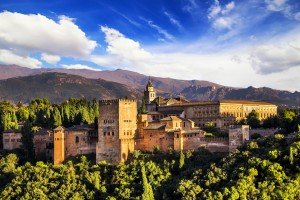Top Four Reasons to Travel to Bordeaux!
December 6, 2024
Bordeaux is well known for being the wine capital of the world, and with good reason. Bordeaux produces at least 400 million liters of -…
Read This Post What things are there to see in Andalusia? Lots of things! Andalusia is one of our favorite parts of Spain – and why not? It’s got amazing cultural sites, great, sunny weather, and fabulous gastronomy. There are so many reasons to visit this fabulous southern region, but we’re focussing on just three.
What things are there to see in Andalusia? Lots of things! Andalusia is one of our favorite parts of Spain – and why not? It’s got amazing cultural sites, great, sunny weather, and fabulous gastronomy. There are so many reasons to visit this fabulous southern region, but we’re focussing on just three.
Granada’s crown jewel, and one of Europe’s most important sites, the Alhambra is a breathtaking site for any visitor to Spain. To give a very brief history, the Moors, who had conquered parts of the Iberian peninsula in the early 8th Century, had been largely kicked out of what is now Spain by the early 13th century as part of the Reconquista. The Kingdom of Granada was the exception, and it remained under Moorish rule for centuries more, until 1492. One cultural patrimony resulting from this is the large fortress complex called “Al-Hambra,” the “Red One.” Although its origins were ancient, it was mostly built in the 13th and 14th centuries, and then converted into a Christian palace after the fall of the Moors in 1492. In fact, it was from within its walls that Ferdinand and Isabella gave their royal permission to Columbus to set sail for the New World. The large complex was subject to neglect, vandalism, and even poorly thought our renovations over the centuries, but none of that detracts from the splendor of it as one of Spain’s most important sites.
You can visit the Alhambra on several of our culinary tours in Spain, including our Jewels of Andalusia and Cooking in the Heart of Andalusian Olive Country.
Córdoba’s Mosque-Cathedral is another great relic of Moorish rule in Spain, even though today it is a Catholic cathedral. The construction of the great Mosque began in the 8th Century on what is believed to have been the site of an early Christian church, and was completed by the late 10th Century. The vast structure includes an arcaded hall full of columns topped by the building’s emblematic alternating red and while voussoirs. Also notable is the ornate mihrab, intricately decorated with depictions of plants and geometric shapes. The Mosque was turned to Christian rule during the Reconquista when Ferdinand III of Castille conquered Córdoba in 1236. After that point the building was subject to some modifications and additions: various chapels were added, the minaret was converted to a bell tower, but the most startling change was the addition of a large Renaissance-style nave in the middle of the structure. The result is a blueprint of Spain’s complex history through its centuries of Moorish and Christian rule.
You can visit the Mezquita de Córdoba on our Jewels of Andalusia culinary tour as well as Cooking in the Heart of Andalusian Olive Country.
These three buildings form a complex in the heart of Sevilla that perfectly capture Spain’s golden age. Sevilla was returned to Christian rule in 1248, but Moorish influences remained in the centuries to follow in the construction and maintenance of these most important buildings. The immense Cathedral, started in 1403, was built on the site of a mosque, and its bell tower, called the Giralda, was a former minaret and a masterpiece of Moorish architecture. One of the World’s largest Gothic structures, the Cathedral also holds the tomb of Christopher Columbus. The Alcázar, originally built in the 10th Century as a Moorish palace, has from its inception been and continues to be a resident of heads of state. The complex, which consists of palatial buildings and gardens, boasts both Mudéjar and Renaissance styles. And finally, the third building, the Archivio de Indias, is a masterpiece of Spanish Renaissance architecture and contains the largest collection of archives concerning the Spanish Empire and the discovery of the New World.
Visit Sevilla with us on either our Jewels of Andalusia culinary vacation or Taste of Seville.
Of course, these are only a few of the wonderful sites to see in Andalusia! Contact us for dates and availability and you too can explore this gorgeous land.
By Peg Kern
Sign up to receive our newsletter, which includes travel tips, recipes, promotions, and information on our best cooking vacations.
Find more photos, videos, food facts, and travel stories from The International Kitchen on Facebook, Instagram, Pinterest, Twitter, and YouTube.